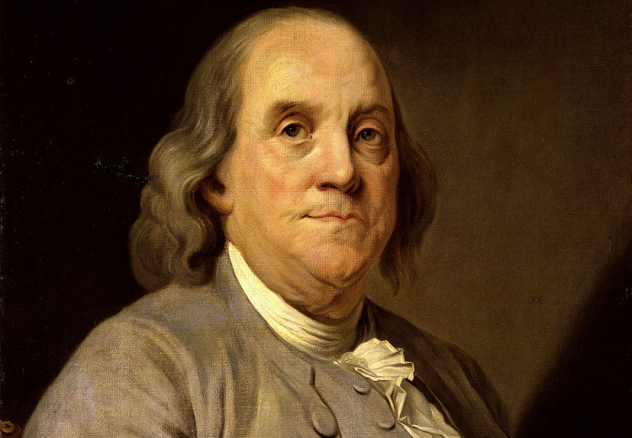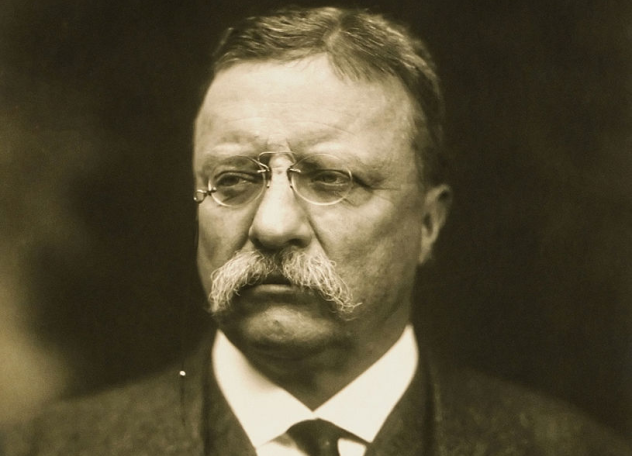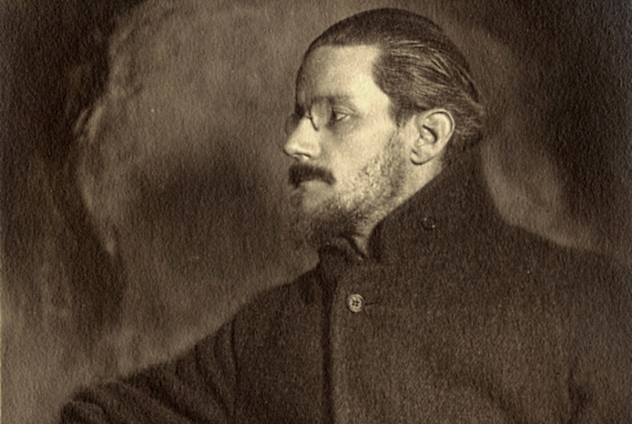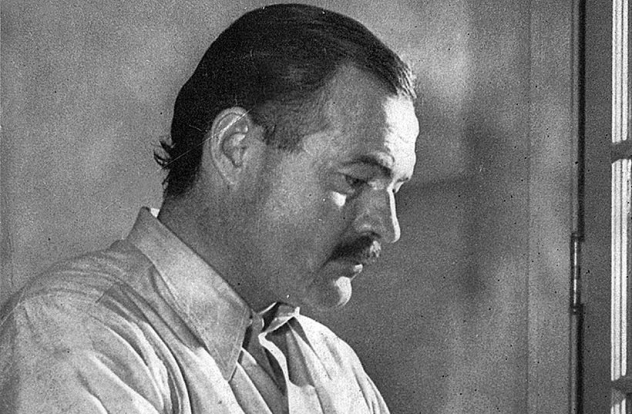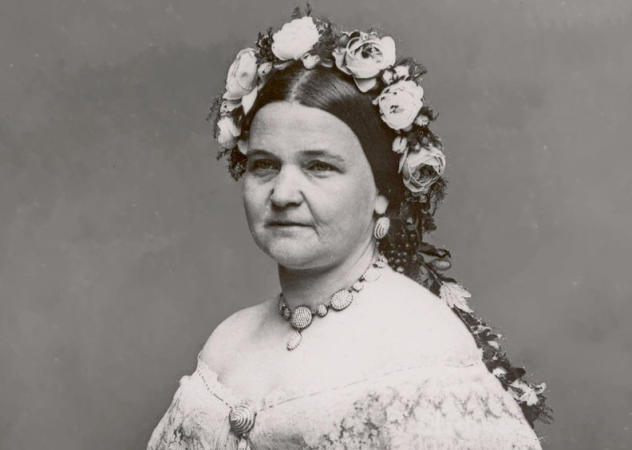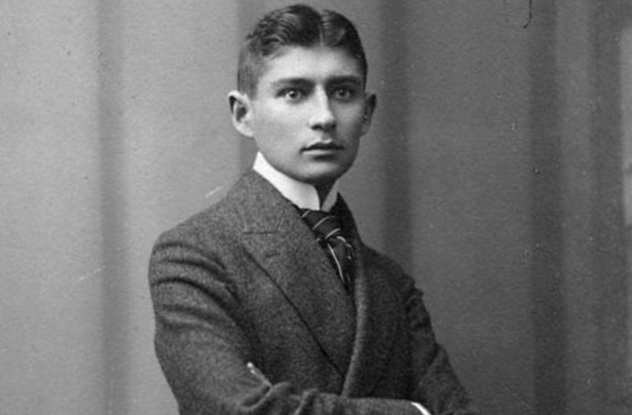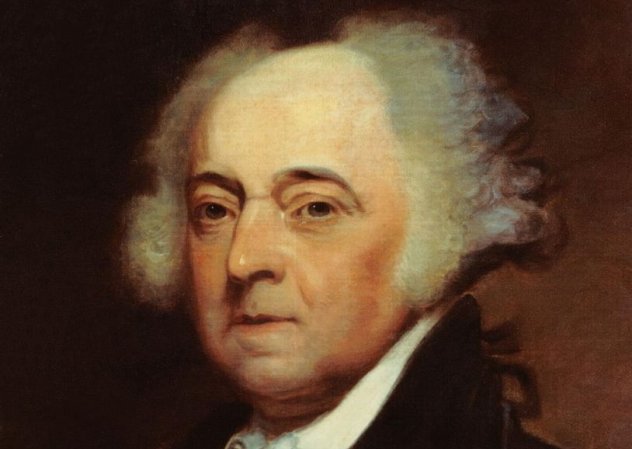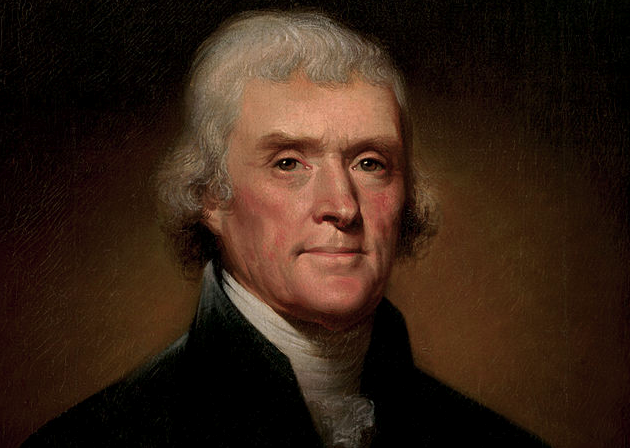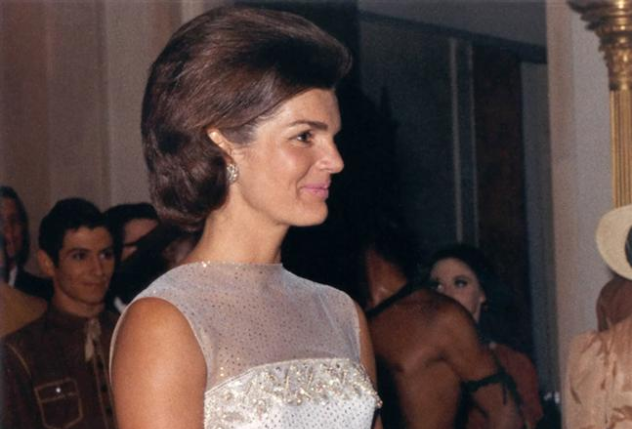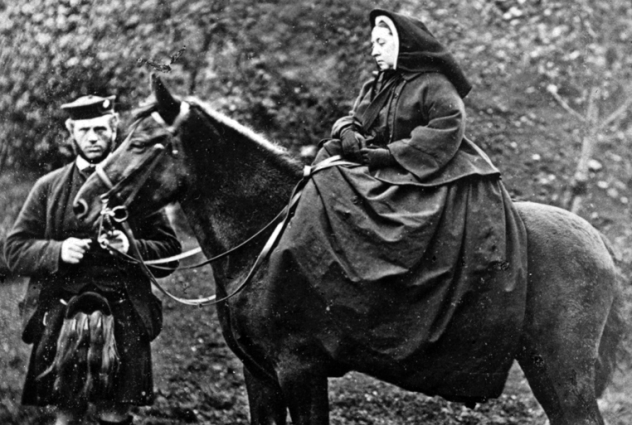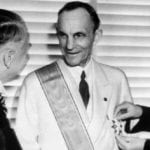10 Benjamin Franklin‘Advice To A Young Man On The Choice Of A Mistress’
Benjamin Franklin was known as a man who enjoyed all that life had to offer. Although it’s not widely remembered today, Franklin frequently published writings on some bizarre subject matters. However, one letter that he wrote wasn’t published until recently. In the letter, Franklin wrote to a young man about his sexual urges. He stated, “Marriage is the proper remedy. It is the most natural State of Man . . . ” After that tame beginning, the letter went in a different direction. He said that if the young man didn’t take his advice to marry, then he should follow his other suggestion: “But if you will not take this Counsel, and persist in thinking a Commerce with the Sex inevitable, then I repeat my former Advice, that in all your Amours you should prefer old Women to young ones.” For the remainder of the letter, Franklin listed his reasons why young men should search for older women. First, older women provide better conversation because they’re more learned than young ones. His second reason was that older women are more tempered. Franklin’s third reason is self-explanatory: “Because there is no hazard of Children, which irregularly produc’d may be attended with much Inconvenience.” Fourth, old women are more sexually experienced, and if their affair is known, they are more easily forgiven. Franklin’s fifth reason is edgy, even for today. Describing the condition of older women’s bodies, Franklin said, “So that covering all above with a Basket, and regarding only what is below the Girdle, it is impossible of two Women to know an old from a young one.” His sixth and seventh reasons are that the sin is less, because an old woman won’t be a virgin, and an affair with an older woman will make her happy. Franklin’s final reason was that, “eighthly and Lastly They are so grateful!”
9 Theodore Roosevelt To His Son
Theodore Roosevelt was one of the greatest US presidents. He was also an avid hunter and sportsman. Most of all, he was a devoted father. He loved his children and always defended them. He maintained an extensive correspondence with his children, and when his son Theodore Roosevelt Jr. went to college in 1905, he became the subject of media scrutiny. Often, the media would make exaggerated claims about Theodore Jr.’s behavior. Two surviving letters written by Theodore Roosevelt expressed his opinion of the reporters harassing his son and showed what kind of father he was. They showed a kinder side of Roosevelt, which stands in direct contrast to his rough persona. He began the letter by giving his son advice: “The thing to do is to go on just as you have evidently been doing, attract as little attention as possible, do not make a fuss about the newspaper men, camera creatures, and idiots generally, letting it be seen that you do not like them and avoid them, but not letting them betray you into any excessive irritation.” He told his son not to let the newspaper men keep him from doing what he wants, writing, ” . . . for you can never in the world afford to let them drive you away from anything you intend to do, whether it is football or anything else.” Roosevelt had a tenuous relationship with the press, and he couldn’t stand that they tried to get to him by attacking his children in print. A recurring theme throughout the letters was Roosevelt’s distaste for journalists, whom he referred to as “idiots.” Roosevelt finished his letter by reassuring his son but cautioned him to not make a scene: “Do not let these newspaper creatures and kindred idiots drive you one hair’s breadth from the line you had marked out in football or anything else. Avoid any fuss, if possible.”
8 James Joyce’s Correspondence With Nora Barnacle
James Joyce is best known today for his books, which changed literature forever. His novel Ulysses is still considered to be one of the greatest books ever written. In his personal life, Joyce was passionately in love with a beautiful woman named Nora Barnacle. They engaged in a relationship that was scandalous for the time, in which she bore him two children before they married. In 1909, Joyce and Barnacle were living in Trieste. Joyce had to go to Dublin on a business trip in October and didn’t return until December of that year. In the meantime, he wrote some very explicit letters to his wife. The letters ranged from speaking about his love for Nora to very explicit sexual acts. Many of the acts that he described were for his own gratification. (Some of the described acts can be found in his other writings.) This is an example of how Joyce described Nora at the end of one letter: “Nora, my faithful darling, my seet-eyed blackguard schoolgirl, be my whore, my mistress, as much as you like (my little frigging mistress! My little f—king whore!) you are always my beautiful wild flower of the hedges, my dark-blue rain-drenched flower.”
7 Ernest Hemingway To Marlene Dietrich
Ernest Hemingway, like James Joyce, was one of the great writers of the 20th century. Marlene Dietrich was one of the most beloved actresses in the golden age of Hollywood. Recently, a letter from Hemingway to Marlene Dietrich went up for auction. The letter is described as odd and flirtatious and contains a bizarre sexual Broadway act from Hemingway’s own imagination. Hemingway wrote the letter in 1955, 20 years after first meeting Dietrich on a cruise in 1934. Their relationship lasted until Hemingway’s tragic suicide in 1961. The letter began with Hemingway calling Dietrich “my dear Kraut.” (Dietrich was German.) It went on to the aforementioned Broadway act, which began with Dietrich “foaming at the mouth,” and then said that the two would “break into the Abortion Scene from ‘Lakme’ [a French opera].” At one point, he even mentioned a “giant rubber whale.” He didn’t stop there: It would probably have something novel like having you shot onto the stage, drunk, from a self-propelled minnenwerfer [sic] which would advance in from the street rolling over the customers, as you landed on the stage drunk and naked, I would advance from the rear, or your rear, wearing evening clothes and would hurriedly strip . ? . ? . to cover you revealing the physique of Burt Lancaster. Though the letter became more lucid, and Hemingway wrote more romantic portions, Hemingway and Dietrich never consummated their relationship because of “unsynchronized passions.”
6 Mary Todd Lincoln After Abraham Lincoln’s death
As the first lady of the United States, Mary Todd Lincoln’s life was stressful enough. On top of that, several of her children died young, and she suffered from painful illnesses and severe depression. Mary certainly lived a hard life, but the tragedy only continued when she witnessed the assassination if her husband. This event seems to have led to her spiraling out of control. Several letters by Mary have been uncovered, written before she went to court to be declared legally insane in 1875, 10 years after Lincoln was shot. They showed the depth of sadness that she lived with. They revealed a woman who suffered more than many could fathom. In one of her letters, Mary said that the only thing that kept her going was the thought of death and seeing her husband again: “The hope of our reunion in a happier world than this, has alone supported me, during the last four weary years.” In a letter to her doctor, Mary Todd described her severe insomnia and asked for “powders” (most likely choral hydrate): “Please oblige me by sending about 4 more powders. I had a miserable night last night & took the 5 you left. What is to become of this excessive wakefulness, it is impossible for me to divine.” No doubt the darkest letter that Mary wrote was her specific instructions for her funeral. While it is common for people to plan how they will be honored, Mary Todd wrote her letter seven years before her death.
5 Franz Kafka’s Odd Love Letters
Franz Kafka, another 20th-century writer, is known for his books with confusing, impossible situations. Although Kafka lived a relatively ordinary life (he worked for an insurance company), when he wrote his innermost thoughts to his various girlfriends, they came off sounding as odd as his writing. He had a few different lovers during his lifetime, and much of his correspondence is preserved. The personal writings of Kafka showed the innermost thoughts of a very strange man. In one set of letters, Kafka revealed his infirmities to his fiancee, Felice Bauer. Kafka says, “I’m the thinnest person I know.” In another, Kafka said, “I have to sleep alone,” and, “I cannot live with people.” Kafka went on to describe his ideal living situation, specifically that “the best mode of life for me would be to sit in the innermost room of a spacious locked cellar with my writing things and a lamp.” Felice Bauer had a full set of gold-capped teeth, which made Kafka write, “The hellish luster so scared me at first that I had to lower my eyes.” He also stated that he felt an aversion to Felice “at the sight of her dancing with her severe eyes lowered, or when she ran her hand over her nose and hair.” In a letter to Milena Jesenska, another girlfriend, Kafka showed his anxiety by how he signed his name. He first crossed out “Franz” and wrote “wrong.” He then crossed out “F” and wrote “wrong.” Finally, he crossed out “yours” and again wrote “wrong.” He then wrote, “nothing more, calm, deep forest.”
4 John Adams’s Letter About George Washington
While John Adams is one of the least remembered founding fathers today, he was once a leading figure of his day. He was George Washington’s vice president, second president of the United States, and father of future president John Quincy Adams. As Washington’s vice president, he was effective and determined in his position, but a recently released letter showed just how Adams felt about his boss. Adams’s 1807 letter to his friend, a physician named Benjamin Rush, was extremely critical of the first president and showed a vindictive side that very few people know about today. When George Washington died in 1799, he was widely seen as an American hero. Adams hated this. He felt that Washington didn’t deserve the saintly status that he received in death. In the letter, Adams mentioned many of Washington’s “talents”—“an handsome Face,” a “tall Stature,” “an elegant Form,” and “graceful Attitudes and Movement.” Adams believed that these were no more than birth traits which Washington had been lucky enough to receive. Adams begrudgingly said that only two traits of Washington’s were earned—“the gift of silence” and “great self-command.” As a final point, Adams believed that if Washington had lived past 1799, he would have been so beloved that he would have received a third term.
3 Thomas Jefferson On Religion
It’s common knowledge today that Thomas Jefferson wasn’t a devout Christian. He was a skeptic who investigated the Bible and many other religious texts, searching for answers about the universe. While Jefferson doubted much of what was written in the Bible, specifically the miracles of Jesus, he did examine the more historical texts and the philosophy of Jesus Christ. In 1787, Thomas Jefferson wrote a letter to Peter Carr, his nephew, which examined education and the pros and cons of what to learn. The most interesting part is Jefferson’s writing on religion and how it should be studied, in which he told his nephew, ” . . . shake off all the fears and servile prejudices under which weak minds are servilely crouched.” In other words, Carr shouldn’t be afraid to question the text of the Bible. Jefferson also wrote that questioning the existence of God is good, saying, “Question with boldness even the existence of a god; because, if there be one, he must approve of the homage of reason, rather than that of blindfolded fear.” Jefferson felt that an enlightened man in the era of enlightenment shouldn’t allow himself to be hindered by religion, which he considered to be a tool to hold down the unintelligent. While many hold up the US founding fathers as men of God, extensive evidence shows that Thomas Jefferson was a man who didn’t have such beliefs.
2 Jacqueline Kennedy To Father Joseph Leonard
In 1950, Jacqueline “Jackie” Kennedy (then Jacqueline Bouvier), went on a trip to Ireland where she met the esteemed Father Joseph Leonard. Jackie was only 21 when they met for the first time, and Leonard was 73. They quickly became close friends, and Jackie started writing letters to Leonard. Their exchange went on for 14 years, lasting through Jackie’s marriage to John F. Kennedy and his assassination. Although Jackie only met Leonard twice in the 14 years that they wrote to each other, her letters to him displayed a degree of trust that she had with no one else. Jackie’s letters were very candid; for a woman with a very public life, they are quite revealing. In one letter, After Kennedy was killed, Jackie wrote, “I am so bitter against God.” Jackie then tried to rationalize it, writing, “I think God must have taken Jack to show the world how lost we would be without him but that is a strange way of thinking to me—and god will have a bit of explaining to do if I ever see him.” While Kennedy was still alive, Jackie wrote about her worries that he was cheating on her and equated him to her father, himself a notorious womanizer. She said Kennedy “loves the chase and is bored with the conquest—and once married needs proof he’s still attractive so flirts with other women and resents you.” In another letter, Jackie gave her opinion about Kennedy’s mother, Rose: “I don’t think Jack’s mother is too bright—and she would rather say a rosary than read a book.” Finally, Jackie acknowledged her own vulnerability and wrote about how Father Leonard was shaping her mindset, saying: It seems to me you know everything and from all you’ve read and learned you can pick and choose the most lovely things for me. Does it give you a sense of power to think you’re molding someone else mind and taste? I hope it does and certainly no one ever had a more willing piece of putty to work with.
1 Queen Victoria And John Brown
Queen Victoria was and is one of the most beloved monarchs in England’s history. She led her country as it became one of the biggest empires of all time and worked intensely to improve the state of Britain. While the Victorian Era is almost a byword for repression, many still indulged in illicit sexual relations. Because of her position, Victoria had to remain aloof and chaste. However, her private life was pretty interesting when it came to love and lovers. Today, many historians have found Queen Victoria’s relationship with John Brown, her highland servant, intriguing. While many knew that she had a close relationship with Brown, the exact nature of their dynamic is up for debate. A letter written by Victoria seems to prove the theory that she and Brown had a romantic relationship. The letter was vague, but it clearly indicated that Victoria loved Brown. In it, she described Brown’s qualities: “Perhaps never in history was there so strong and true an attachment, so warm and loving a friendship between the sovereign and servant . . . ” Queen Victoria was a woman who showed very little sentiment toward anyone, but to John Brown, she changed her tune. The only other person who Victoria was so emotional to was her dead husband, Prince Albert. Whatever the case, Queen Victoria’s letter showed that even the most noble of us still desire companionship. Gordon Gora is a struggling author who is desperately trying to make it. He is working on several projects but until he finishes one, he will write for Listverse for his bread and butter. You can write him at [email protected].
